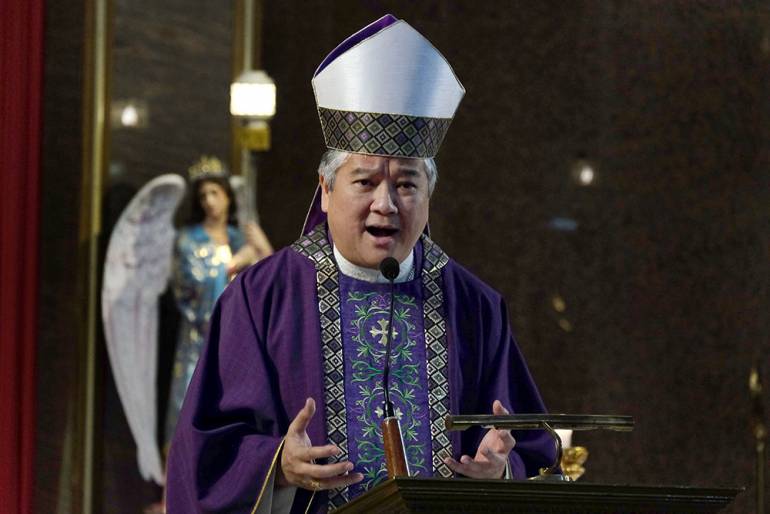Philippines archbishop talks on “Blessings of Mercy” related to Fiducia Supplicans

Philippines Archbishop Socrates Villegas talks about “Blessings of Mercy” related to the Vatican’s Fiducia Supplicans in a statement he issued on December 19 from Saint John the Evangelist Cathedral under the Archdiocese of Lingayen-Dagupan, where he is head.
On December 18, the document "Fiducia supplicans which was issued on December 18 with approval from Pope Francis, allowed Catholic priests to bless Catholic couples in irregular situations, including cohabitating relationships, non-sacramental civil marriages, divorced and remarried unions, polygamous bonds, and same-sex unions, said Villegas.
It opens up the possibility "of blessings couples in irregular situations and same-sex couples without officially validating their status or changing in any way the Church's perennial teaching on marriage," he added.
There are two kinds of blessings: liturgical or ritual, which are official blessings of the Catholic Church, and spontaneous blessings, which are informal works of blessings chosen by a priest at the request of the faithful, said Villegas, noting the emphasis on the pastoral meaning of blessings.
In his statement entitled “Blessings of Mercy: Episcopal Guidance for the Implementation of Fiducia Supplicans”, Villegas said the Vatican document adds to the list of blessings.
The third category of blessing, a blessing or mercy, follows after St. Augustine and St. Thomas Aquinas defined mercy as "heartfelt sympathy for another's distress, impelling us to assist him if we can" (Summa Theologiae, II-II.30.1), which Villegas says is asking for mercy, which is a request for pity and for remedy.
On what it means to say that a Catholic priest blesses a couple in a cohabitating relationship, a polygamous bond or a same-sex union, and for the priest, on what words he should use if he is asked to bless a couple in these irregular situations, especially since Fiducia Supplicans leaves the words of the blessing itself to the discretion of the priest, Villegas elaborates.
“A blessing is an invocation to God—a request to God—to exercise His power on a person or a thing. Only God can, and human beings cannot bless. Typically, after praising God for His majesty and glory, Catholic blessings ask God to do one or two things. First, we ask God to dispel the evil that may be in a person or a thing. This is what happens when a priest blesses a car or a deacon blesses a newly purchased rice field. This is a blessing of exorcism.”
Citing the Book of Blessings, Fiducia Supplicans explains: "So that this intent might become more apparent, by an ancient tradition, the formulas of blessing are primarily aimed at giving glory to God for his gifts, asking for his favors, and restraining the power of evil in the world" (no. 10)
Villegas says when a Catholic priest prays a blessing of mercy on a couple in an irregular situation who "desire to entrust themselves to the Lord and his mercy, to invoke his help, and to be guided to a greater understanding of this plan of love and of truth" (no. 30), he is asking God to have pity on both of them and to give them the grace of conversion so that they can regularize their relationships.”
This blessing of mercy is not and cannot be a blessing of sanctification since we cannot ask God to bless something that, as Fiducia Supplicans explains, is not “comformed to God's will, as expressed in the teachings of the Church" (no. 9). Priests who are invited to bless couples in irregular situations should choose the appropriate words to reveal the intent of the Church, said Villegas.
“We turn once again to our Lord Jesus Christ, who is the incarnation and instrument of God's mercy." The Catholic Church is called to preach the power of grace through prayer and Holy Communio and the mercy of Jesus Christ through the sacrament of penance. It is Jesus Christ, and He alone, who can heal every broken human heart after years of unconditional love and authentic friendship, said Villegas. (MTV)
Radio Veritas Asia (RVA), a media platform of the Catholic Church, aims to share Christ. RVA started in 1969 as a continental Catholic radio station to serve Asian countries in their respective local language, thus earning the tag “the Voice of Asian Christianity.” Responding to the emerging context, RVA embraced media platforms to connect with the global Asian audience via its 21 language websites and various social media platforms.














